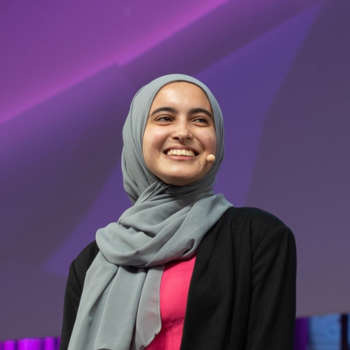
The Hunger Games: The Ballad of Iftar and Dates
Finding my community on campus through spiritual practice and vibrant tradition
My stomach grumbled loudly. I had 1 hour and 33 minutes left until I could eat, and yes I was counting down the seconds. Though this was day 5 out of 30, I hadn’t adjusted yet to my new eating schedule, so getting through classes without breakfast or lunch was mildly difficult. The afternoon had arrived, and I couldn’t focus enough to tackle anything that required even a modicum of brainpower. Instead, I decided to head to the student center and lend a hand in setting up our 100-person dinner. Being an undergrad at that point still, I was sure I’d eventually be able to catch up on my work, maybe even later that night.
My stomach grumbled again, willing me to eat, but I redirected my thoughts towards each measured step to Lobdell and the eventual reunion I would have with my friends and community that evening. This is what a typical day of fasting feels like at MIT.
Though it might sound demanding, I am really looking forward to the month of Ramadan, a very special time of year for Muslims. This year, it starts in early March. For 29 to 30 days, depending on the lunar cycle, Muslims worldwide will fast, i.e not eat or drink from dawn to sunset. And I know what you’re wondering, and the answer is no, not even water. The purpose of this practice is multifaceted: it serves as a means of mindfulness and spiritual closeness to God, an exercise in self-discipline, and a way to empathize with those less fortunate around the world.
Across many cultures that are traditionally associated with Islam, Ramadan is a time of immense family and community importance. Since it coincides with the spring semester for the next few years, we can’t spend it with our families back home. Instead, the MIT Muslim Students Association (MSA) hosts large community-wide iftars, or dinners, for us to break our fast every evening with the people I consider to be my second family.
The MSA also hosts night prayers and other activities throughout the month. People have compared fasting and praying in Ramadan to running a marathon, not a sprint, so it is important to pace oneself. Some of my most vivid memories come from delirious late nights balancing MIT coursework, religious obligations, and deep conversations with friends. There is something uniquely profound about watching the sunset, eating dinner with your second family, staying up all night, and praying a final, communal prayer before witnessing the sunrise.
The Muslim community at MIT is incredibly diverse, encompassing individuals from various departments, ethnicities, cultures, and walks of life. Each individual brings a wide range of experiences, interests, and talents to the proverbial (and literal) table. From questions as simple as “do we all perceive color the same” to deeper ones like “what has been your most impactful life experience” or “how has your interest in science shaped your relationship with God”– there is no shortage of fascinating conversations to be had amongst the MSA community during Ramadan and beyond.
Despite our differences, it is the comfort in the similarities of our upbringings that makes the MSA truly feel like home. Though we all come from our own corners of the world, our Ramadans and Islamic practices growing up feel the same. We recount stories of our first fasts, our favorite home-cooked meals, and the best parts of our communities back home. With my Muslim friends, I don’t have to awkwardly explain that I need to pray, follow a halal diet, or abstain from alcohol. There’s a profound sense of comfort in having people understand you without having to explain yourself.
However, even with this understanding and supportive community, it can be challenging to explain my needs to professors and ensure they are adequately addressed. Fasting for a whole month and participating in religious obligations can be overwhelming on top of academics and research. There are times when all the demands I shoulder take a severe toll on my health. Over the years, I have found that early communication is key to getting accommodations that help me balance my physical, mental, and spiritual health. It’s through open and effective communication that we bridge the gap between our internal experiences and the support we require from others.
As I approach what is likely my final Ramadan at MIT, I find myself in a contemplative state. This sacred month has been a cornerstone of my journey here, filled with invaluable experiences, personal growth, and cherished connections. I am looking forward to the new faces I will meet, lessons I will learn, and memories I will make one final time. Ramadan Mubarak, MIT!
Share this post:
